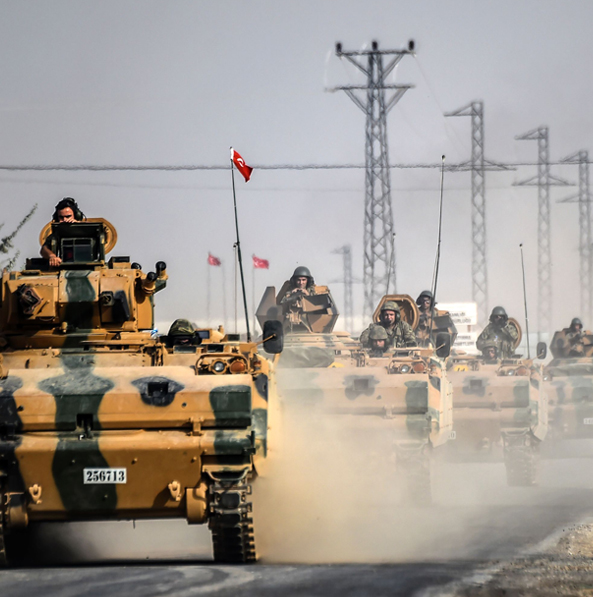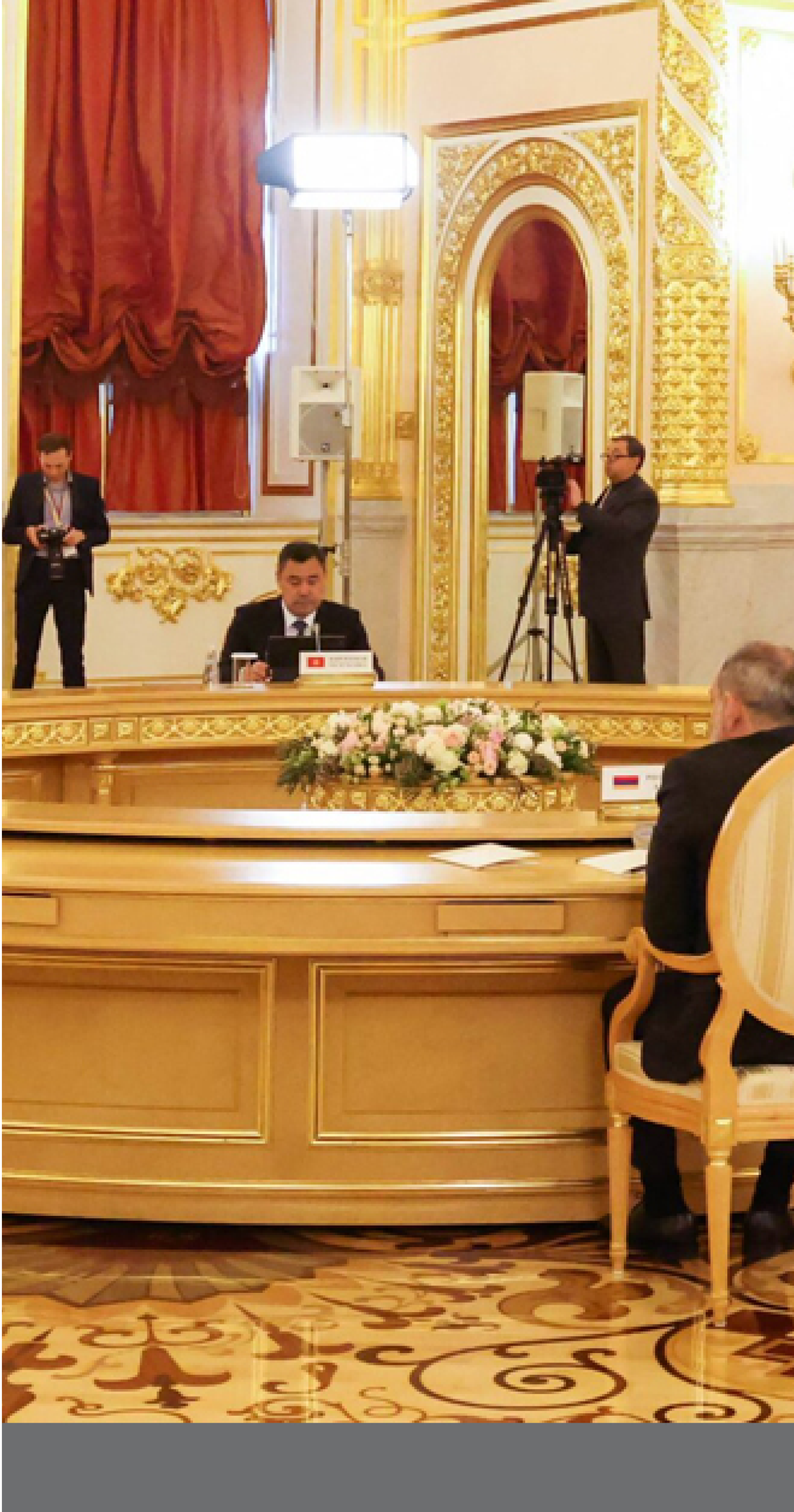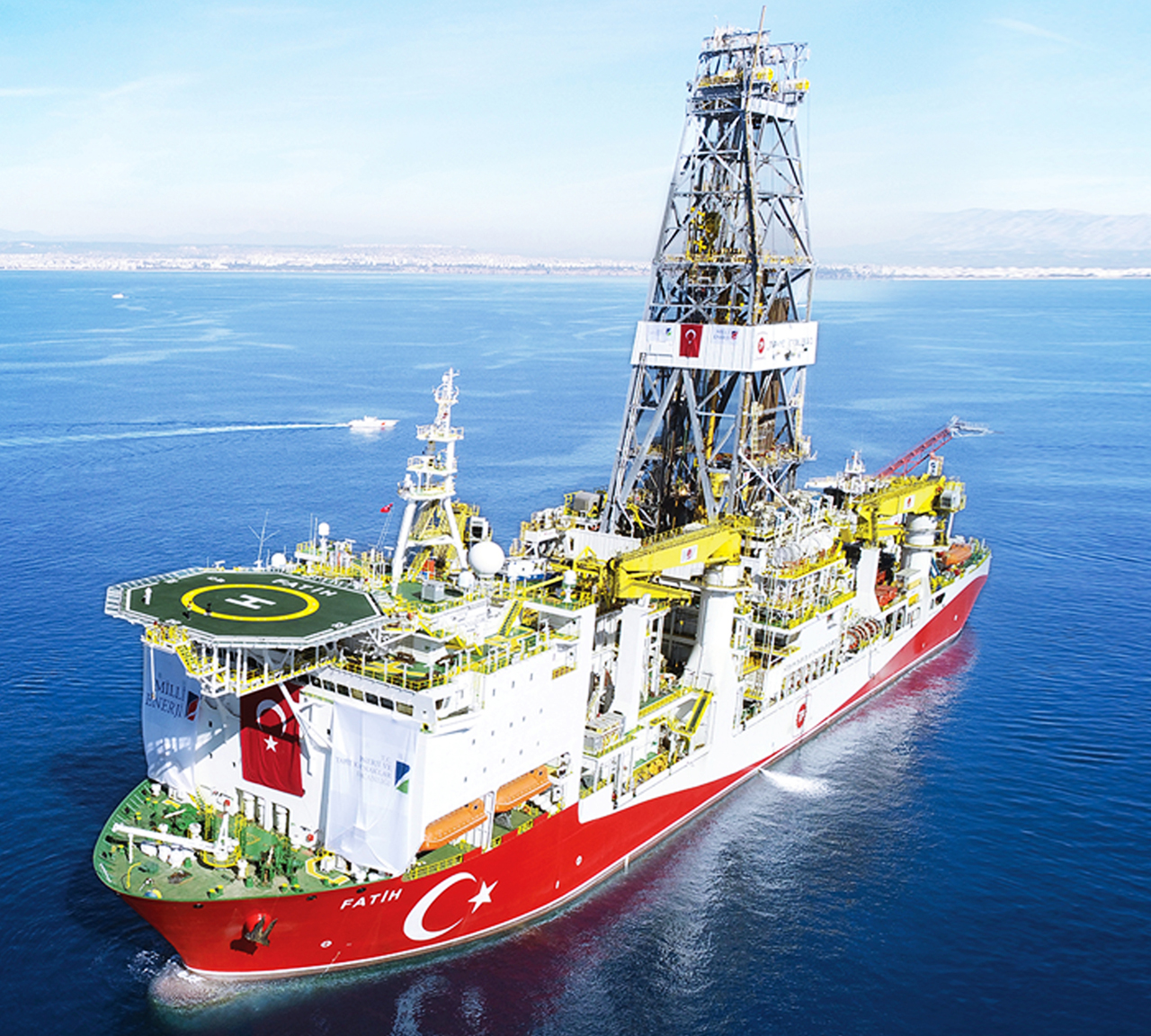Since 2016, Turkey has launched three major military operations deep into Syrian territory (Euphrates Shield/2016), (Olive Branch/2018), (Peace Spring/2019), during which thousands of Turkish troops crossed the Turkish-Syrian border to counter ISIS, take control of areas under the control of the autonomous administration of Kurdish People's Protection Units (YPG) and expel the Syrian Democratic Forces, in an effort to establish a buffer zone 30 kilometers from the border.
Apart from the "legal" aspects, Turkish military operations in Syria may seem understandable to some analysts and observers. First, Turkey has a historical precedent in its military operations against Kurdish armed elements, specifically the Kurdish Workers’ Party (PKK) in Iraq, such as (Operation Steel/1995), (Operation Hammer/1997), (Operation Dawn/1997), (Operation Sun/2008).
Secondly, the so-called "Arab Spring" has produced a complex security landscape on Turkey's borders with Syria and Iraq, where conflicts have prevailed and state sovereignty declined. The most significant challenges for Turkey have been the proliferation of armed groups that question the national borders of countries such as ISIS, the growing Kurdish desire for independence (referendum on the independence of the Kurdistan Region/2017), and the Kurdish autonomy on Turkey's southern and eastern borders.
In fact, since the 1990s, Turkey has dealt with armed groups, particularly the PKK, in accordance with the military strategy known as "active deterrence,” which is based on confronting early security threats. However, the purpose with which military force has been used recently does not appear to fall under the category of security threats. For example, in 2020, the Turkish military clashed directly with government forces in Idlib, and in the same year Turkey provided support to Azerbaijani forces in the Nagorno-Karabakh conflict, not to mention the deployment of their proxies in some parts of Syria and Libya.
This deployment has coincided with many indicators. Military spending in 2019 was 2.7% of Turkey's GDP compared to (1.8%) in 2015, thus Turkey surpasses NATO’s average spending of 1.8% in 2019, according to the Australian Institute of International Affairs. In addition, the support for its domestic military industries increased, as the country's arms imports have dropped from 70% to 30% in 2020, according to the Carnegie Endowment for International Peace, and have 7 companies in the top 100 defense companies in 2020. The 2019-2023 strategic plan published by the Turkish Presidency of Defense Industries indicates that the localization of defense products will increase to 75% by 2023.
Meanwhile, there have been many analyses of Turkey’s expanded military footprint. Some say it is the result of Turkey’s advanced defense strategy in the face of external threats; some argue that Ankara's resort to a tougher foreign policy is linked to the international and regional position, which is dominated by the use of hard power; while others claim that reliance on military force is the result of Turkish President Recep Erdogan's preferences, and serves his expansionist aspirations in his quest to restore Turkey’s old legacy. With these analyses that may or may not be true, the calculations of external interventions may need a more extensive, comprehensive vision and are subject to sensitive and precise considerations.
The Turkish utilization of military force can therefore be traced across three main dimensions:
The first is the geopolitical dimension, based on geopolitical calculations that balance Turkey’s relations with the countries of the world.
The second is the domestic dimension, based on the influence of nationalist calls seeking to restore Turkey's regional status.
The third is the economic dimension, which is the economic and geo-economic factor of Turkey’s military interventions.
First: The geopolitical dimension
Turkey is deploying its military units in various parts of the world, such as its military base in Somalia, the joint military base in Qatar, the Turkish military presence in Cyprus since 1974, and Turkish peacekeeping forces in Afghanistan, and the task of this military presence has been limited to training and consulting only.
But the Turkish army has recently taken up geopolitical tasks serving Turkish reform frameworks and President Recep Tayyip Erdogan's calls for regional status. This military strategy for Turkish policymakers has resulted in Turkey achieving a presence in various conflict areas, from Syria and Libya to Azerbaijan.
In Syria, the Turkish army intervened in 2020 - as mentioned above - to counter the advance of Syrian government forces in Idlib. In Libya, a security agreement was concluded in 2019 between the Turkish government and the Government of National Accord, under which Turkey was able to intervene directly and stop the attack of the Libyan General, Khalifa Haftar, to take control of Tripoli, forcing him to withdraw later to Sirte. As for the Azeri-Armenian conflict, the Azerbaijani army was able to take control of many towns and villages in Nagorno-Karabakh as a result of Turkey’s support. The importance of this support is illustrated by statements by Azerbaijani President Ilham Aliyev, in which he praised Turkish weapons and the role of drones in reducing casualties and increasing the strength of the Azerbaijani army.
Accordingly, this support has played a role in redrawing geopolitical realities in the Caucasus region. According to the Russian newspaper Moskovskij Komsomolets, Turkey has made "an unprecedented breakthrough in the political space that Moscow has always regarded as its own."
In the previous three cases, the Turkish utilization of military force has contributed to a balance with major powers such as Russia and the European Union, and has positioned the scene in Turkey's vital surroundings in the face of a state of mutual deterrence and accurate calculations, so that it has become an actor that cannot be ruled out in international and bilateral talks. For example, Turkey is a party to talks related to the Syrian issue, such as those of Astana and Sochi, and it has also played an active role in the Ceasefire Agreement between Armenia and Azerbaijan and is engaged in talks with Greek officials for de-escalation in the eastern Mediterranean.
"Turkey has gained the strength to implement its political and economic policies on the ground with active military support," President Erdogan said after a meeting with the Turkish Cabinet in early October 2020. "Those who are used to speaking to us in an authoritarian tone are now negotiating with us on an equal footing...," he added.
Second: The domestic dimension
The Justice and Development Party is facing a changing domestic reality, as successive economic crises and the lower exchange rate have led to a decline in popularity at home. In 2018, despite winning 44.32% of the vote in municipal elections, the Party has lost seats in some major cities, including Ankara and Istanbul. A poll conducted by the Center for American Progress in the same year also showed that 50% of respondents had a negative view of the AK Parti.
Not to mention the emergence of new political formations, along which the electoral landscape that has been dominated by the party for decades has changed. In 2015, as Turkey began its new military doctrine, the Peoples' Democratic Party (HDP) stepped up the Turkish parliament, resulting in AK Parti losing its absolute majority for the first time, and then being forced to form an alliance with the National Movement Party (MHP) to regain its majority.
This has led to base social and political approaches on some combination of Islamism and nationalism which later became prominent features of Turkish foreign policy. In this regard, a recent report by the US Congress in 2020 noted the consequence of this alliance, as the local view of the partnership between the religiously oriented AKP and th National Movement Party has prompted further efforts to nationalize Turkish politics for the sake of insuring a wider spectrum of popular vote in the elections. The report also pointed to an important point: the extent to which this alliance has influenced foreign policy in an unprecedented way since the period prior to the Turkish alliances with the West in the Cold War, bringing to mind the "new Ottoman" narrative to restore Turkey's regional status.
In fact, Turkish military activity abroad plays a role in feeding Turkish nationalism at home, and it indirectly benefits the PJD to compensate for the damage of the country's faltering economy, as many of its critics at home have even supported their country's approach to foreign policy in general. According to a poll conducted by the Center for American Progress, 33% of respondents from the Peoples’ Democratic Party, and 39% of CHP support these ideas, noting that they are opposition parties. 43% of the CHP supporters demand making foreign decisions independent of cooperation with other countries. According to the same poll, all parties generally supported the idea that Turkey should be self-reliant in its defense and military industries.
On the other hand, restoring the country’s regional status is part of the vision and objectives of Turkish President Recep Tayyip Erdogan. Constitutional amendments in the essence of government and in the political structure -- from a parliamentary system to a presidential one in 2017 -- have allowed the president to play a major role, supported by several powers to manage civil-military relations, and to be a strong player in the military and defense structure. These shifts in the structure of the state and society began to emerge after the attempted military coup on July 15, 2015, in which military policy became subject to the preferences and orientations of the presidency.
It is not just President Erdogan, but there is a global context in which nationalist leaders participate in an active and bold regional policy. The Russian president, Vladimir Putin, has become engaged in various activities in Russian foreign policy, such as Russian intervention in Georgia and northern Ukraine, and the annexation of Crimea. So is Chinese President Xi Jinping, who presented his vision of China as a global power, and observers note an increase in china's hard power tools in the South China Sea and east Asia in general.
Third: Economic and geo-economic dimension
Turkey views its wide military footprint as part of its plans for economic transformation within profit and loss estimates and accounts, especially at a time when it is looking to achieve economic achievements and transformations in the Turkish economy, from traditional industries, agriculture and tourism to a focus on the military and defense industries and oil and gas pipeline projects.
1. For military and defense industries, Turkey's arms exports in 2019 increased by 34.6% compared to 2018, and reached $3 billion, according to the Defense and Aviation Industry Manufacturers Association. According to data from the Stockholm International Peace Research Institute for 2015 - 2019, Turkey ranked 14th in the list of 25 arms exporters in the world.
2. Energy demand is one of the main burdens on the Turkish economy. In 2019, the cost of energy in Turkey was about $41.7 billion, representing 5.5% of GDP, according to ING, a website specialized in economic and financial analysis. Turkish exploration in the eastern Mediterranean and Black Sea will therefore contribute to significantly reducing its dependence on energy from abroad, not to mention the expected economic returns.
In fact, competition for energy and the promotion of defense industries lead to more spending and proliferation. Turkey has highlighted its own military technology by using it strikingly in many places of conflict, against -- as mentioned above -- ISIS, Kurdish Protection Units in Syria, the PKK in Iraq, and the Armenian army in Nagorno-Karabakh. Many researchers and experts link Turkey's military utilization to the gradual increase in its defense and military industries, as it has become able to achieve self-sufficiency in many of its military equipment and tools, including the production of drones, armored vehicles, self-propelled missiles and home-made weapons.
On another level, Turkey has emerged as an active competitor to the energy geopolitics of the Mediterranean coinciding with the return of the concept of "blue homeland”. It is a geostrategic concept devised by retired General Admiral Cem Gürdeniz in 2006 and was reused by the Turkish Navy in a special report in 2019. It includes the expansion of Turkey's military footprint in the surrounding waters and on the high seas around the Anatolian Peninsula. According to the 2021 Global Firepower ranking, Turkey has 16 frigates, 10 cruisers, 35 patrol ships and 12 submarines, demonstrating its superiority from a force perspective in the Middle East.
Conclusion
This study dealt with Turkey’s utilization of military force by researching the main dimensions such utilization; these are geopolitical, local and economic, and they constitute the objectives of the foreign policy of any country. Accordingly, the study found that the use of military force can be seen as part of a new direction of Turkish foreign policy, as it achieves the desired goal of pursuing the policy of "zero problems" devised by the former Foreign Minister, Ahmet Davutoglu, after the region has undergone changes with which soft power could no longer achieve influence and status.
In this regard, Turkey, as a country with economic, military and human potential, seeks through its foreign policy to strengthen its position. Its use of military force in the conflict zones of Libya, Syria and Azerbaijan is part of this policy, through which it has achieved a geopolitical balance with major world powers, most notably Russia and the European Union.
Furthermore, the study showed the link between the objectives of Turkish foreign policy, particularly for the use of hard power, and its return on domestic affairs. Like other nationalist leaders, Turkish President Recep Tayyip Erdogan pursues a foreign policy that enhances his gains at home. Turkish interventions abroad feed national calls at home, especially as the results of the interventions continue to suggest that they are balanced and achieving their purpose. For example, Azerbaijan’s celebration of the re-establishment of areas in Nagorno-Karabakh and the presence of Turkish President Erdogan could be considered a part of “propaganda" that would bring popular gains.
On the other hand, the study showed the importance of the economic dimension of the use of military force, at a time when Turkey seeks to achieve economic transformations based on increasing the sale of its homemade weapons, achieving independence, albeit in part, in the field of energy, like any other country with the same objectives. For example, Turkey’s sales of its Bayraktar Tactical UAS have increased after proven efficient in the battles of Idlib and against Armenia, while the expansion of its naval fleet is seen as a force for financial returns from gas discoveries in the eastern Mediterranean.
However, the utilization of military force in Turkey faces several challenges, the most important of which are:
1. Turkey has become the target of international sanctions, most recently those of the European Union and the United States in 2020. This will have an impact on Turkey's economic affairs and defense industries.
2. Turkish military spending is a burden on the budget and economy, and the alignment between military expenditures and development programmes is an economic challenge for the Turkish government.
3. Turkey must balance its military interventions abroad with the measurement of the strength and size of the adversary and its consequences in each arena of conflict.
Keep in touch
In-depth analyses delivered weekly.

Related Analyses:









